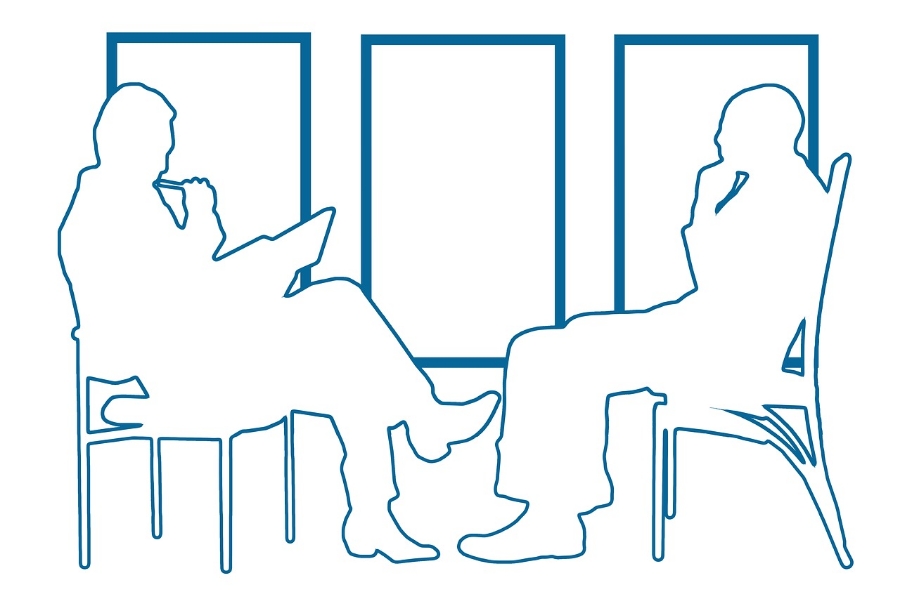
Keep Control of the Interview
Ensure that you are physically comfortable.
Make the interview setting comfortable for yourself: choose an upright chair to avoid slouching, keep the room at or just below normal temperature (as TV lights are very hot and can quickly warm up the space), and have a side table for water and notes.
Avoid placing any furniture (such as a table) between you and the reporter to prevent appearing aloof, and do not use swivel chairs, which can allow too much unconscious movement and make you seem nervous.
Keep in mind that press conferences will have their own furniture arrangements, which is often just a long table set up to face the media.
Keep bottles of water handy.
Interviews under hot lights can be dehydrating. Having a bottle of water close to hand gives you an opportunity to pause before answering tough questions or regaining control of the discussion. These pauses are beneficial during live TV, taped, or print interviews, but less so on radio or audio-only podcasts. Bottles of water are preferable to glasses of water, because they’re not as easy to spill.
Be honest and sincere.
If you do not know the answer to a question, admit it and offer to find out. Always be truthful, even if the answer is embarrassing. Credibility is critical; dishonesty will be discovered and damage your reputation and that of your organization.
Stay calm and self-contained.
Remain composed, even if questioning becomes intense or aggressive. An emotional response may become the focus of the story, overshadowing the real issues. Strive to keep the tone conversational, not confrontational.
Project confidence.
Exhibit self-confidence, as it inspires trust in you and your message. However, be careful not to appear arrogant, as over-confidence can alienate your audience.
Handle complex questions strategically.
When faced with multi-part questions, acknowledge them and answer each part individually, starting with the section you are most comfortable with. This approach buys time to formulate responses to more challenging components, and sometimes the reporter may move on before all parts are covered.
Practice using pauses.
Wait for the interviewer to finish their questions before responding. Taking a brief pause before answering gives you time to compose your thoughts. Although a pause may feel long, it is rarely noticed and provides valuable thinking time. In recorded interviews, pauses are typically edited out; in live broadcasts, a short pause is still acceptable.
Never assume anything is “off the record”.
Assume that everything you say in the presence of a reporter may, and probably will, be used. Unguarded or off-mic comments can be embarrassing, and some reporters may use “warm-up” questions or pretend a recorder is off to elicit informal remarks—these are not off the record.
Remain vigilant after the interview appears to be at an end. It’s easy to relax and lower your guard, but reporters may continue to ask questions—sometimes with a recorder still running, even if it appears off. Stay alert until you are certain the interview is truly over.
Work With the Interviewer
Provide background information.
Offer a brief biography focusing on qualifications and experiences relevant to the interview topic. Provide some background information about the organization in simple, clear language to aid the reporter and ensure accuracy.
Stick to the facts.
Do not exaggerate. Reporters often seek other perspectives to verify your statements. Sticking to verifiable facts reduces the risk of contradiction.
Be direct, concise and avoid using jargon.
Direct questions deserve direct answers. Answer questions succinctly, using one or two sentences when possible. Avoid rambling, as it can appear evasive, but also avoid simple “yes” or “no” responses unless absolutely warranted. Use lay language and avoid industry jargon to ensure your message is understood by all audiences.
Avoid saying “no comment”.
Responding with “no comment” is considered rude and implies you have something to hide. Instead, say you do not currently have enough information to answer accurately and offer to follow up when you do.
Use inclusive language.
Use “we” instead of “I” whenever possible, as it suggests a broader concern for others’ interests. Connect your answers to the public interest, and use examples or metaphors to clarify your points.
Maintain eye contact with the interviewer.
If cameras or photographers are present, focus on the person asking questions, not the equipment. Avoid looking away, as it may appear indifferent or insincere. Maintain eye contact to build rapport and read cues from the interviewer. If there is an audience present, include them in the conversation with a glance, nod, smile, etc. in response to such audience reactions as laughter at a witty remark.
Avoid using negative or accusatory language.
If a reporter uses negative language or accusations in a question, do not repeat them in your answer. Denials may be quoted out of context, potentially conveying the opposite of your intent. Instead, respond with positive statements that clarify the truth.
Correct any incorrect or false information from the interviewer.
If an interviewer’s question contains false, incorrect or misleading information, correct it without repeating the misinformation. Preface your reply with a statement such as, “Apparently you have been given inaccurate information. The correct information is...”
Correct yourself as and when necessary.
If you misspeak, do not ask to start over or request that your statement be ignored. Instead, clarify by saying, “Let me clarify that last comment by adding...” and provide the correct information. Assume that anything you say is permanent; your best option is to amend your statement with accurate information.
Maintain professionalism and courtesy.
Reporters are not adversaries, but treating them as such can make them one. Likewise, avoid trying to befriend them—most maintain professional detachment. Be courteous and professional, regardless of their demeanor.
Likewise, you have the right to be expect courtesy and respect during the interview. If you feel otherwise, address it politely. Only terminate the interview if the disrespect continues and only after making your concerns clear. Uncomfortable questions alone do not warrant ending the interview.
Image by Gerd Altmann from Pixabay

